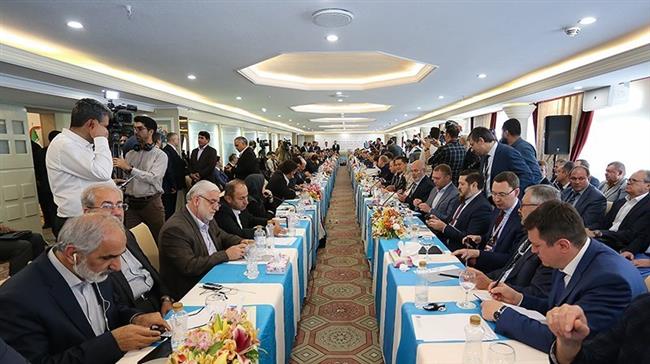
Iran eyes $32bn worth of export to 15 nearby countries
July 16, 2019
The National Pavilion of Export Knowledge-based Products of Iran Will Be Held in Expopharm 2019 in Germany
July 20, 2019Iran and Russia have signed a dozen cooperation agreements covering energy, railway, agriculture, pharmaceuticals and tourism, with senior officials stressing the political will of the two countries to reinforce ties in the face of US sanctions.
The agreements were signed as Russian Energy Minister Alexander Novak visited Iran with a delegation of 120 businesspeople, including representatives of private and public companies.
The two sides held their 15th meeting of the joint commission for economic and trade cooperation in Isfahan Tuesday, which was also attended by governors of several Iranian provinces and ministers of several Russian republics.
“Both Iran and Russia are affected by illegal sanctions. It is hoped that the sanctions can be used as an opportunity to expand ties and increase cooperation,” Iranian energy minister Reza Ardekanian said, stressing that there is “political will” on both sides to do that.
Novak described Iran and Russia as “good neighbors”, saying both are determined to strengthen their cooperation.
The Iranian Ministry of Petroleum’s Shana news agency said the two countries signed a memorandum of understanding covering oil, gas, petrochemicals, electricity and nuclear power.
Russian news agencies cited Novak as saying that Moscow and Tehran have been discussing joint development of Caspian Sea hydrocarbon projects.
Hossein Esmaeili Shahmirzadi, the director general of the department for America, Europe and Caspian States at Iran’s Ministry of Petroleum, told Shana the MoU includes cooperation on exploration, recovery and production of oil, and investment in oil, gas and petrochemical industries.
The two governments stepped up talks on allowing Russian oil and gas companies to develop fields in Iran, in place of Western companies that withdrew under pressure from Washington when President Donald Trump withdrew the US from a 2015 nuclear deal with Tehran last May.
Iranian officials said then as many as 12 projects in the petroleum sector had been presented to Russia’s Gazprom, Rosneft, Gazprom Neft, Zarubezhneft, Taftneft and Lukoil for development.
President Vladimir Putin also said Russia was prepared to continue its oil investment in Iran to the tune of $50 billion in the face of US plans to reimpose sanctions on the Iranian oil and gas sector. But there is yet no concrete deal that has been firmed up.
Sputnik news agency on Tuesday quoted Novak as saying that in their new talks, Iran spoke of its interest in working with Russian gas giant Gazprom to develop oil fields and liquefied natural gas (LNG) projects.
“They are interested in Gazprom taking part in the projects such as oil fields and LNG projects and swap deals,” Novak said.
Iran and Russia have yet to implement an oil-for-goods scheme originally signed in 2014 and extended for five more years, which calls for Iranian crude exports of up to 500,000 barrels per day in return for Russian goods.
The scheme includes Iran’s use of Russian machinery, equipment and installations Iran needs in its strategic petroleum, mining, construction and transportation sectors.
A tentative arrangement calls for swapping around 300,000 barrels per day of Iranian crude oil via the Caspian Sea and the rest from the Persian Gulf.
One of the agreements signed on Tuesday includes the revamp of the Ramin thermal power station in Ahvaz and building four 1,400-megawatt thermal power plants in the southern Hormozgan province, Ardekanian said.
They further agreed to work jointly on several railway projects, fish farming, drug manufacturing, and establishing cruise trips in the Caspian Sea.
They also doubled down on the need to implement previous agreements on implementing the second and third units of the Bushehr nuclear power plant, Ardekanian added.
Novak told TASS news agency Russia could also resume wheat exports to Iran soon.
Iran was one of the largest markets for Russian wheat until it reduced purchases in 2016 because of its self-sufficiency in the strategic product.
Private Iranian millers who are not allowed to use domestic wheat for flour exports, however, still need imported wheat.
In February, Russia, Kazakhstan and Iran signed a memorandum of understanding for cooperation in wheat trading, taking a step towards setting up a free trade zone.


